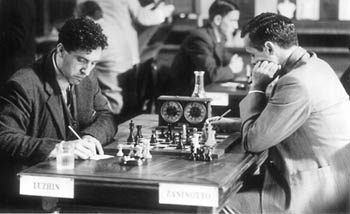![[Metroactive Movies]](/movies/gifs/movies468.gif)
[ Movies Index | Show Times | San Jose | Metroactive Central | Archives ]
 Give Pieces a Chance: John Turturro masters his pawns, if not his demons, in 'The Luzhin Defence.' Chess Nut Gorris' 'The Luzhin Defence' makes all the wrong moves NEVER HAVING seen the film versions of King, Queen, Knave and Laughter in the Dark (both are movies no one has a good word for), I'm in no position to tell whether Marleen Gorris' The Luzhin Defence is the worst adaptation of Vladimir Nabokov yet. Gorris has adapted a novel written very early in Nabokov's career, while he was an émigré in Berlin, and published here under the title The Defense. It's the story of a man so bedazzled by an abstract ideal that life slips through his fingers. The chess master Luzhin (John Turturro) lives only for the board but decides to marry during the course of a tournament in Italy in the late 1920s. Luzhin's intended is a Russian exile named Natalia (Emily Watson), who is saddled with an intimidating, snobbish mother. The pressure of Luzhin's upcoming wedding is compounded by his match with Turati (Fabio Sartor), who, it transpires, is the protégé of Luzhin's old mentor Valentinov (Stuart Wilson, the villain in The Mask of Zorro). Under the strain, Luzhin cracks, and the doctors warn him that more chess will break him completely. An essay on Nabokov's novel by Vladislav Khodasevich (www.libraries.psu.edu/iasweb/nabokov/khodas.htm) describes the book's themes as a treatise on an otherworldly creature who is broken when he tries to live in our world. In this film, however, Luzhin isn't otherworldly. We see him from the outside as shabby and zany, a man hiding in chess, taking refuge in it when he could have a healthy happy marriage and live like the rest of us. And the reason he became a chess master, Gorris tells us, is psychological: he had a depressed mother and a philandering dad. Nabokov, who professed to loathe Freud, might have offered some retorts to a movie proposing that Luzhin's real problem was that his dad didn't love his mom enough. The acting is without much nuance. Turturro plays the chess master as a conventional haywire case. Though the camera sometimes catches the sensuality of Watson's walk, she's mostly swaddled here, looking pale and convalescent. Gorris has picked up all the usual pacing weaknesses of Merchant/Ivory and added some innovations of her own, especially her continuing penchant for confusing, badly integrated flashbacks (and flashforwards, too, as in a notably awkward love scene between Turturro and Watson). Gorris' storytelling is like playing an inferior chess partner--you know all her moves in advance. And there isn't a lot of prewar glory in the soiled, glum Hungarian interiors Gorris used as thrifty substitutes for the architecture around Lake Como. As seen in her cloying film Antonia's Line, Gorris is a crusader for the sane virtues of an untroubled sex life, tolerance, community and fresh air. While I sympathize, I wonder what draws her to the work of brilliant elitists like Virginia Woolf (in her adaptation of Mrs. Dalloway) and Nabokov. These writers elude the commonplace film director who can't think of their eccentric heroes in terms beyond "therapy might help them."
The Luzhin Defence (PG-13; 108 min.), directed by Marleen Gorris, written by Peter Berry, based on the novel by Vladimir Nabokov, photographed by Bernard Lutic and starring John Turturro and Emily Watson, opens Friday at Camera 3 in San Jose. [ San Jose | Metroactive Central | Archives ]
|
From the April 26-May 2, 2001 issue of Metro, Silicon Valley's Weekly Newspaper.
Copyright © 2001 Metro Publishing Inc. Metroactive is affiliated with the Boulevards Network.
For more information about the San Jose/Silicon Valley area, visit sanjose.com.